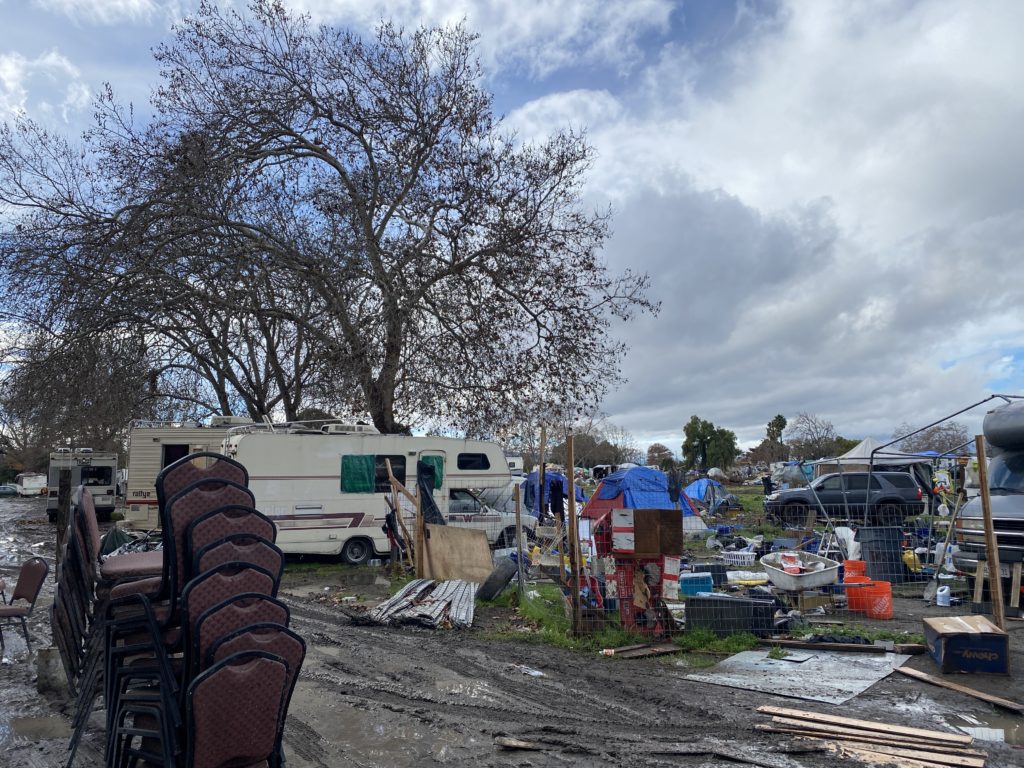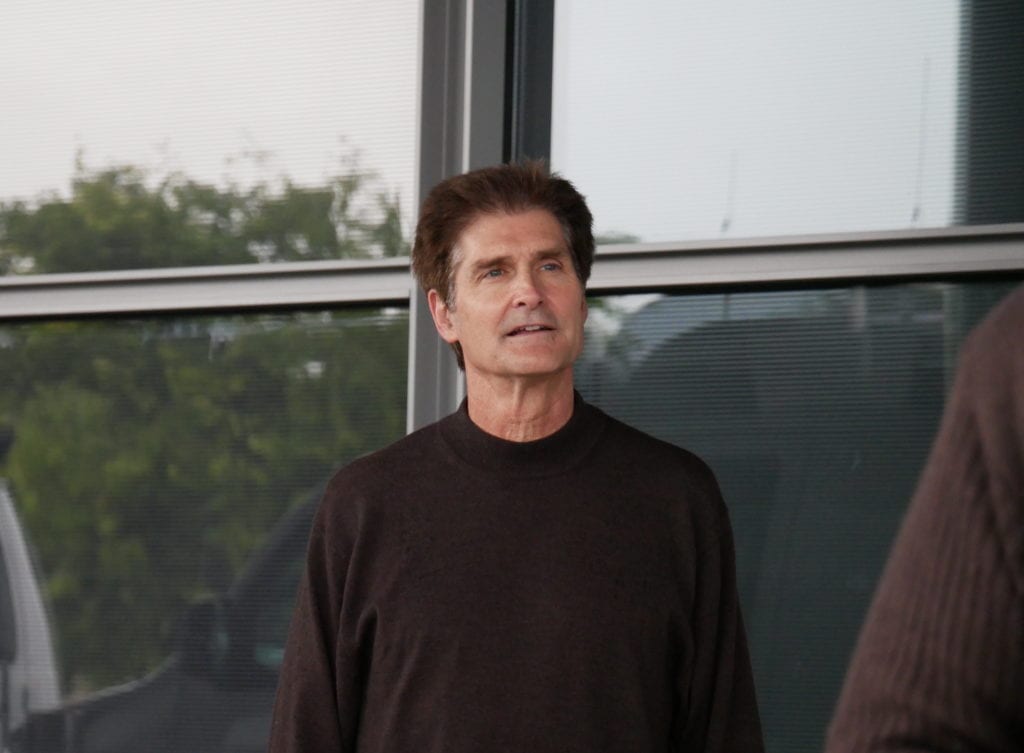This year was a tumultuous one for Santa Clara County politics.
Records revealed San Jose Mayor Sam Liccardo hiding emails, Sheriff Laurie Smith is battling multiple political scandals and a prosecutor is simultaneously suing District Attorney Jeff Rosen and gunning for his job.
Here’s a look at some major political developments that happened in Santa Clara County this year.
School district skips vaccine line
A major South Bay hospital lost its COVID vaccines and CEO after San José Spotlight broke a story about how hospital leaders allowed teachers in a wealthy school district to skip the line in an apparent quid-pro-quo. Santa Clara County temporarily refused to give a hospital more doses of the COVID-19 vaccine after learning its officers allowed a school district to skip the line ahead of seniors and other vulnerable groups.
County health officers demanded Good Samaritan Hospital comply with state and county rules for vaccine distribution after it discovered teachers from Los Gatos Union School District were getting vaccines, even though teachers in the county weren’t eligible at the time. Hospital leaders encouraged teachers to commit perjury by pretending to be health care workers when they signed up for the shots.
Good Samaritan allowed Los Gatos teachers to cut the line because they had helped raise money for meals and health care workers at the hospital.
Major shakeup at San Jose City Hall
Mayor Sam Liccardo lost his council majority this year with the election of Councilmember David Cohen, upsetting the balance of power in San Jose. Cohen’s ascension over Lan Diep gave labor-supported councilmembers a 6-5 majority in 2021.
Before losing his
majority, Liccardo used his business-friendly majority to shoot down the labor-backed Fair Elections Initiative, which would have moved mayoral elections to presidential years. He was also able to muster support to extend a tax break for high-rise developers in downtown San Jose. The shift in power has put Liccardo on the losing side of several important votes, such as a recent proposal to expand coverage of the city’s Project Labor Agreement.
Jim Reed, Liccardo’s chief of staff, said Cohen is a pragmatic lawmaker willing to listen to good policy ideas. Liccardo recently formed a PAC to support political candidates after he’s out of office, and Reed cited Cohen as one politician it would potentially support.
Google comes to town
San Jose lawmakers approved the biggest development in San Jose history earlier this year when they gave Google the green light to construct an 80-acre campus near Diridon Station that will add 25,000 office workers to the area. Google and its supporters pitched the project as a catalyst for revitalizing San Jose’s downtown core, which has struggled in recent years with blight and declining foot traffic.
In 2018, community members protested the project—some literally chaining themselves to chairs inside City Hall—saying it will displace businesses, contribute to gentrification and cause rents to go up. The San Jose Sharks team fought the project because it could increase parking woes around their home arena at the SAP Center, at one point threatening to leave the city. Google tried to appease local residents and business owners by creating a $200 million community benefits fund to help small businesses remain in the area. The city calmed the Sharks with a guarantee to give the franchise 2,850 parking spaces during construction of the campus, and to consult with the organization on the final design.

Redrawing political maps
Armed with 2020 census data, South Bay lawmakers redrew the political boundaries in San Jose and Santa Clara County. The once-in-a-decade process is supposed to make sure districts have equal populations, but it’s also a chance for groups to gain—or lose—political power.
Santa Clara County adopted a map advanced by a coalition of civil rights and labor organizations who want to increase representation for historically marginalized communities. But the map also weakens conservative power in District 1 by removing from it Los Gatos and Almaden Valley. Conservatives say the map is gerrymandering because it cuts out two candidates from the District 1 election in 2022: former San Jose Councilmember Johnny Khamis and Los Gatos Vice Mayor Rob Rennie.
San Jose lawmakers adopted a compromise map that dramatically redraws Districts 2 and 10 while preserving most existing boundaries for Districts 5, 7 and 8. The redistricting process was marked by outbursts from councilmembers who accused each other of trying to dilute the votes of minority communities. Residents repeatedly clashed in public hearings over map options, with some accusing the proponents of the Unity Map—a product of labor and civil rights organizations—of being special interest groups. Asian American community leaders expressed frustration with having no representation on the city’s Redistricting Commission.
Over the objections of Liccardo, a state commission divided San Jose into four Congressional districts. The split divides some of the South Bay’s core tech cities and puts part of Alum Rock in a Voting Rights Act district that stretches down to King City. The South Bay’s population is massive and commissioners said they struggled as to how best preserve communities of interest.
Homelessness crisis worsens
People are living and dying on the streets in San Jose and Santa Clara County in growing numbers.
Despite lofty speeches and ambitious plans to eliminate homelessness in the South Bay in the next few years by building up emergency and permanent housing, thousands of people are still living on the streets. More than 200 people died in Santa Clara County this year—worse than any year in the past decade. Ignoring pleas from advocates, San Jose has swept more than 200 homeless encampments since January.
The city is in the middle of a months-long campaign to clear out a massive encampment near Columbus Park. The FAA has threatened to withhold federal funding if San Jose doesn’t remove scores of people living on airport-owned land, which airplanes fly over daily.

Problems plague sheriff
Long-term Santa Clara County Sheriff Laurie Smith has been under siege for months. In August, the Board of Supervisors requested the U.S. Department of Justice, California Attorney General and a civil grand jury investigate Smith’s office over its handling of the jail, the site of multiple injuries and a death involving mentally ill inmates.
The board took a vote of no confidence in Smith, and Liccardo made the unusual move of demanding she step down. A civil grand jury recently accused Smith of corruption and misconduct over her alleged practice of granting concealed weapons licenses to political donors, and for failing to cooperate with a county inquiry into an internal investigation of the jail.
The embattled sheriff is also facing three challengers for her seat, which is up for reelection in 2022.
Lobbying behind closed doors
Local energy company Bloom Energy received an exemption from a landmark ban on natural gas in new commercial buildings in San Jose after an aggressive lobbying campaign behind closed doors.
Carl Guardino, executive vice president of government affairs and policy, appeared to leverage his close friendship with Liccardo and campaign donations from his PAC to win a carve out for his employer. In total, Bloom executives and lobbyists met with councilmembers 26 times in less than a month. Bloom Energy’s fuel cells can use alternative fuels such as biogas and hydrogen, but climate advocates claim they still contribute significant carbon emissions.

Mayor hides emails
Liccardo dodged public records law by routinely using his private email to conduct city business and deleted a public email to skirt disclosure laws, according to a series of San José Spotlight investigations.
Emails obtained by San José Spotlight show one case where Liccardo, after being contacted on his city email address, asked an individual to contact him at his private email account. He also promised the individual he would delete their conversation from his government email. Storing conversations on private servers opens public officials to potential California Public Records Act violations.
The fight over emails escalated this summer after the city refused to turn over emails related to an advocacy group created by Liccardo called Solutions San Jose. San José Spotlight appealed the denial and the city’s Rules and Open Government Committee directed the city to create a log disclosing information about the withheld emails, but still did not release the emails. San José Spotlight appealed that decision in October to the Board of Fair Campaign and Political Practices. The board discovered it had no authority on the matter and couldn’t even view the records.
The revelation about this loophole in city policy baffled several commissioners, who questioned what their role is supposed to be in the appeals process. The board referred the appeal back to the City Council, asking it to review the matter in closed session and clarify its own role in the records hearing process.
VTA’s toxic work culture
After VTA experienced the worst mass shooting in Bay Area history, details emerged about a toxic work culture in multiple departments. Workers in VTA’s IT department demanded an external investigation after experiencing intimidation tactics and harassment from management. Allegations about similar behavior surfaced in other departments. VTA’s largest union accused the agency of neglecting its workforce after an employee who survived the May shooting died by suicide.
The VTA board of directors agreed to hire an outside consultant to look into the work culture problems at the agency and find solutions. CEO and General Manager Carolyn Gonot said this is part of a multi-pronged strategy to transform the agency’s work environment.

San Jose tweaks government
After nearly a year, a commission charged with recommending changes to San Jose’s city charter wrapped up its work.
When the San Jose City Council reconvenes next year, councilmembers will be tasked with deciding on several recommendations for altering—or keeping—features of local city government. Among the most important is a recommendation to not change the city to a “strong mayor” system, which would grant the mayor the power to hire and fire department heads at will.
Lawmakers will also decide whether to switch mayoral elections from midterm election years to presidential election years to boost turnout among low-income and minority voters. And the City Council will have the option of adding four new council districts to the city to reflect population increases. Any final updates to the city’s charter will need to be approved by San Jose voters.
Contact Eli Wolfe at [email protected] or @EliWolfe4 on Twitter.



Leave a Reply
You must be logged in to post a comment.